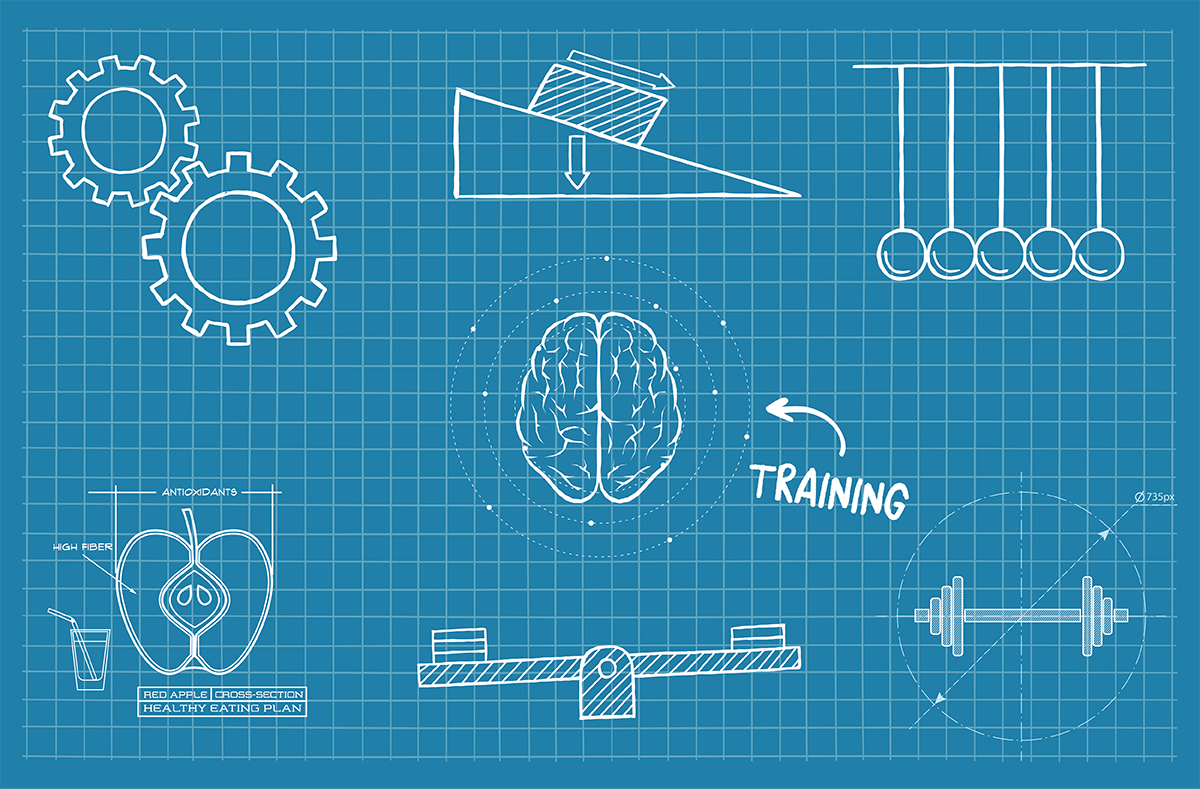
Intermittent fasting, body-positivity, tapping, or weight loss surgery…what will be the thing that finally works for you?
I’m going to be real with you…this is going to be a tricky one to answer1.
As we spoke about in my last article, we are trying to solve an imperfect puzzle, and the end result when we put it all together is going to look completely different for each of us, so there’s not even a picture on the box of what it’s supposed to look like. That said, let’s put some of the pieces together and see if we can gain a clearer picture.
It dawned on me you may be thinking…
“Why should I listen to Glenn?”
If so, this is a brilliant question, as my first advice would be to strictly vet anyone trying to sell you an answer (metaphorically or literally)!
You can learn more about me here, but I’m a pretty good person to help as I have professional experience working with all of the major approaches!2 And after almost 15 years supporting people with their eating, physical movement, weight, and body-image, I’ve not yet tied myself to one approach, because I’ve never found research for, or been able to practice, an approach that’s the complete answer for everyone.3
So if you’re happy with your due diligence, let’s begin crafting your weight management blueprint.
In my last article I said your solution would involve 3 things:
- A firm decision to stop doing what hasn’t been working for you.
- A careful and informed reflection about what will work for you.
- A commitment to the new approach to see if it really is right for you.
Let’s start with…
A firm decision to stop doing what hasn’t been working for you.
Diet and exercise approaches have about a 97% failure rate in the medium to long term, and despite all of them claiming to, none of them show any better results. If you want to discover whether the next weight loss product (or program, or pill) you are considering has better odds than the average you need only to ask:
that have been published in peer-reviewed scientific journals?”
Asking this question, you will likely research yourself into the sobering realization there’s nothing to suggest it’s any different to the past diets that have failed you. If you ask the person trying to promote it, you may observe them either slowly edge for the door or attempt to weasel their way around the question4. If in your exploration you do find something that truly satisfies the question…
Email me ASAP!!
(I want to know about it too, it could save us all a lot of headaches!)
Now that we know what not to do (well, hopefully!), let’s move on to…
A careful and informed reflection about what will work for you.
To help you start to figure out what may work for you, I’m going to use the use BMI categories as a general guide, starting with the “overweight” group…
EEEK, THE BMI!
You probably loathe the BMI as much as I do, but these categories underpin our desire to lose weight (at least for medical reasons), so it will help to at a minimum reinterpret them. And, as you’ll see, we’re going to use them a little differently…
BMI 25 – 30 You probably think you need to lose weight, but this is an idea you (and your doctors) have been convinced of by the pharmaceutical industry5. If we look at epidemiological research6, you are actually in the longest living category! If you want to, focus on improving your body image, developing intuitive eating abilities, and find fun in movement, but my main advice for you is to just get on with living your life.
BMI 30 – 40 You may or may not benefit from focusing on weight loss. If you don’t have any health problems (if you guessed that I don’t want you to consider BMI a health problem, you’re right – if it’s an “indicator of health problems” that don’t actually exist, it’s not much of an indicator!), you can follow the guidelines for BMI 25-30. If you do have health problems, as diet and exercise programs don’t work in the long-term, focus on working on the health issues directly, rather than through an attempt to lose weight, and seeing what happens. For example, if you have high blood pressure maybe it can be resolved with stress management and physical activity (both of which are easier to accomplish than lasting weight loss). You will probably end up healthier, and if you get a bit of weight loss as a result – bonus! If the health problems persist beyond what you are comfortable with, and your BMI is above 35, then you may begin to consider bariatric surgery.
BMI 40 + There is a good chance your health would improve with losing some weight. Nevertheless, still avoid the temptation for diet and exercise weight loss plans, as, even if you are above your most healthy weight, this approach is unlikely to work long-term7. Again, focus on improving any health issues directly, and monitor the results over time. If you have done this, and still legitimately feel your health is suffering due to your weight, it may be worthwhile considering bariatric surgery with a qualified surgeon who also offers good interdisciplinary support pre- and post surgery8. If you don’t want to do surgery, it may be better to make room for any health burdens you are experiencing, and focus on living a rich, full meaningful life at the weight you are at.
Where do tapping & hypnosis fit in? As tapping & hypnosis are tools moreso than approaches, they can be used in any of the categories. As a general (and evidence-based) rule, when used properly they will both increase the benefits and reduce the risks of any approach.
And if I’m not unhealthy but just want to look better? Of course, sometimes it’s not really about your health (even if you pretend it is!). The best way to feel more comfortable in your own skin – in ANY of the above categories – is to work on body positivity. Improving your body-image can transform both your psychological wellbeing and physical health no matter your size or shape. As it’s now normal to feel shame around your body (even if you look like the skinny Instagram model you think you’d kill to be!) I recommend almost all my clients take time to learn the language of body positivity.
If none of those answers seem completely satisfactory – I get it – none of them sit perfectly with me either. That’s why, with almost every client, I prefer a blueprint that:
COMBINES APPROACHES
While the different approaches may not fit ideologically (and are often not all done with the one health professional), the good news is – if you’re smart about it – you can put them together in a way that practically works beautifully for you!
Here are some of my favourite combos:
- Non-dieting with a like-minded dietitian, psychologist, & PT.
- Tapping & Hypnosis (the two “woo-woo” therapies make a great team)
- Non-dieting & bariatric surgery (sound weird? watch this vid!)
- Body-image & EVERYTHING!
A quick case in point.
Having just finished this year’s Twelve Month Transformation, we’re analysing participants’ results (I’ll share them with you soon, because I’ve just looked, and they’re unbelievably heartening and a bit mind-blowing!). I was talking with a researcher who commented:
We already have nice neat data showing how each of the individual approaches work and, honestly, it’s not that impressive. I’m much more interested in the results of an approach where we let go of what doesn’t work, reflect on both the at the benefits and downfalls of what does, and make informed decisions about putting it all together in a personal blueprint that works for each unique individual.
For homework9 I’d like you to have a look over the last two blogs, and any of the related links, and start to reflect on what approach (or approaches!) may be the best for your blueprint. I’d love to hear your thoughts, and I’ll be back soon to show you how I’m putting it all together in our (new-and-improved!) combined approach, and focus on the last part of finding your answer, and possibly the most life-changing:
A commitment to the new approach to see if it really is right for you.
I created this blog for people just like you.
If you found it valuable, please help me share it with them!
1. I have taken longer to write this article than any this year, by far! The question is so complex we spend 2 whole hours answering it in the first workshop of the Twelve Month Transformation (or 2 modules for people who do the Twelve Month Transformation Online!)
2. A quick snapshot to share my experience if you want to know a little more:
- Academic research in psychology of weight management (2004 – current)
- Working with Endocrinologist specializing in weight & diabetes (2005 – current)
- Head of Psychology for largest interdisciplinary weight loss clinic in Australia (2006 – 2013)
- Learning from world leaders in non-dieting, intuitive eating, HAES ®, & body positivity (2007 – current).
- Clinical Hypnotherapist (2008 – current)
- Consultant at Qld’s most reputable Bariatric Surgery Clinic (2009 – current)
- Teaching evidence-based practice to dietitians, psychologists, and fitness professionals through peak governing bodies (2008, 2010, & 2015 respectively – current)
- EFT (Tapping) Practitioner (2013 – current)
3. In fact, it’s one of the reasons why our clients love our work, but it also draws a lot of criticism from the purists (read fanatics!) of each individual approach.
4. It’s actually really funny to watch – I love posing this question to people when they ask me to promote their programs and watching their reactions – if they opt for weasling, here are some facts I’ve found useful to have on hand:
- Rats are not humans (what works for them may not work for us).
- A team of paid experts does not equal a research study.
- A theory that seems to make sense is not a clinical trial.
- A story of “someone who made it” is not evidence.
- A shiny pamphlet or video is not a peer-reviewed study.
- “Just try it for yourself” doesn’t cut the mustard.
5. I would LOVE to go into more detail (and we do in our Workshops & Online Programs) but here’s the basic drum: The (official-sounding) International Obesity Task Force (IOTF) was established to inform the World Health Organisation about “The Obesity Epidemic” (a term it coined) and recommended BMI cutoffs be lowered in 2001 to the levels they are currently, which makes sense…except for the fact that it was counter to the evidence suggesting they should have been raised. Oh, and the lion’s share of IOTF funding came from…dah dah daahhhh…the two drug companies with the two biggest weight loss drugs on the market at the time.
6. Flegal, K. M., Kit, B. K., & Orpana, H., et. al. (2013) Association of all-cause mortality with overweight and obesity using standard body mass index categories: A systematic review and meta-analysis. Journal of the American Medical Association, 309 (1), pp. 71-82.
7. If at the end of all this, you feel you MUST do a diet and exercise weight loss program, doing one that is (a) supported by a qualified health professional and (b) flexible in it’s nutrition and exercise prescription lowers your chance of negative outcomes. Also, doing Cognitive Behaviour Therapy with a qualified psychologist tends to result in larger weight loss that regains less quickly. Incorporating tapping & hypnosis if you are open to it is also likely to help, as initial research suggests these approaches are linked with longer lasting weight losses.
8. Doing surgery without the support of a quality surgeon and a team of allied health professionals is running a high risk of failure, and literally taking your life in your own hands.
9. You didn’t think you’d escape homework two blogs in a row, did you?




